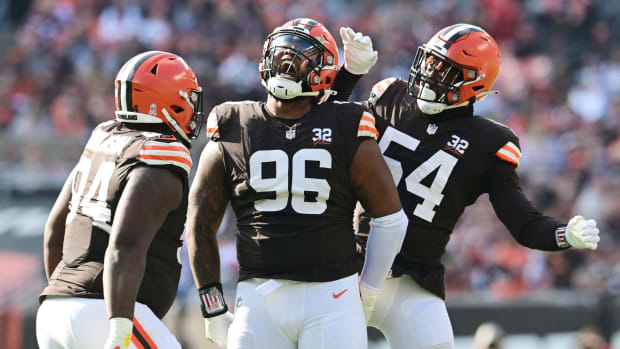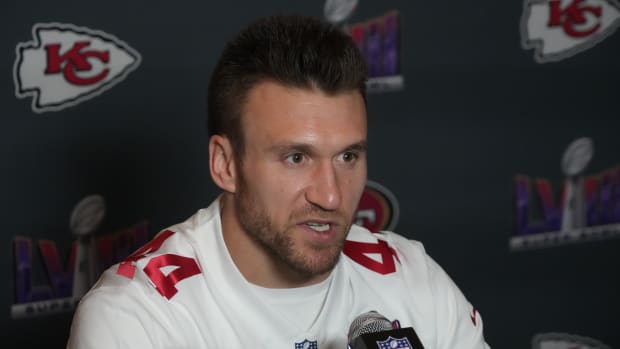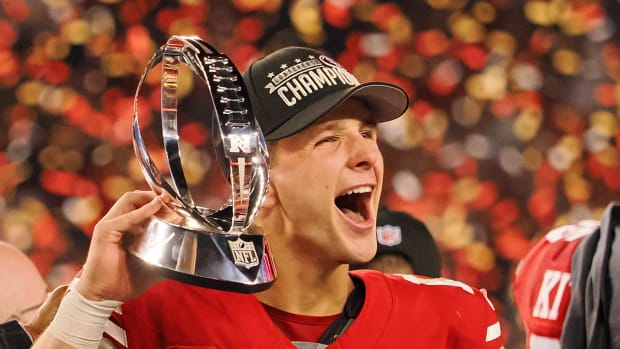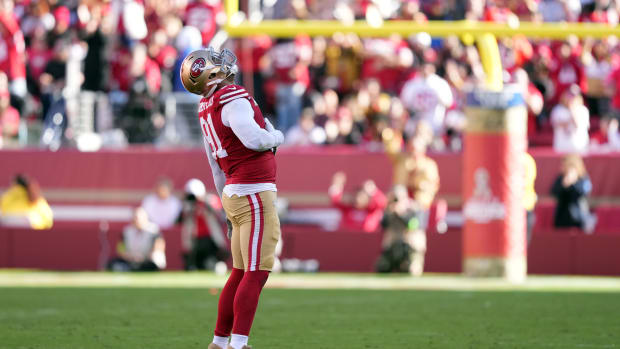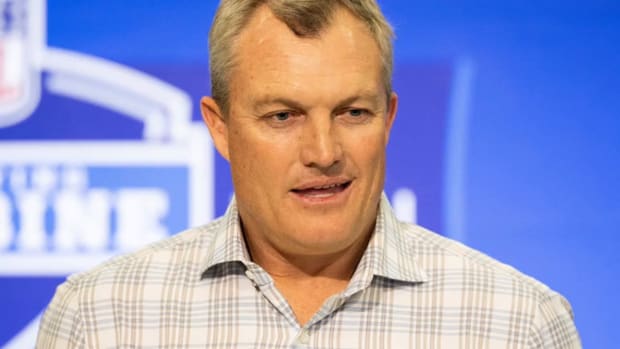What Should the 49ers do With Pending Free Agent Emmanuel Sanders?
Over the past couple of weeks, I’ve laid out the organization’s options and shared my opinion on what the San Francisco 49ers should do with pending free agents Arik Armstead and Jimmie Ward. Continuing with this theme, here I take a look at the situation with wide receiver, Emmanuel Sanders.
It became very evident early on in the season that the 49ers needed help at wide receiver. Promising rookie Jalen Hurd was placed on injured reserve at the beginning of October, and head coach Kyle Shanahan wasn’t exactly shy about sharing his frustrations with Dante Pettis. As a result, San Francisco sent a fifth-round pick over to the Denver Broncos in exchange for Emmanuel Sanders.
The trade paid off for the Red and Gold as Sanders quickly emerged as one of the team’s top targets. Despite only participating in 10 regular-season games with the 49ers, the veteran racked up 36 catches for 503 yards and three touchdowns. He essentially became the team’s number one wideout and helped take some of the pressure off George Kittle and Deebo Samuel. But now, general manager John Lynch has a decision to make.
Like Armstead and Ward, Sanders’ contract is set to expire making him a free agent next month. However, unlike those two, the 10-year pro is more than just a one-hit-wonder and has a proven track record of success that includes two Pro Bowl appearances and three thousand-yard seasons. Given his history, the thought process behind what to do with the wideout is very different than it is with the two defenders.
As with every pending free-agent, Lynch and Shanahan have three options when it comes to Sanders: the franchise tag, a contract extension, and letting him walk. Below is a look at the pros and cons of each.
Franchise Tag
I’m going to somewhat gloss over the franchise tag when it comes to Sanders for a couple of reasons.
For one, he’s not really who the designation is designed for. The tag is typically used for younger players who are ascending and their teams want a slightly bigger sample size to see what the guy can do, like Armstead or Ward. In March, the wideout will turn 33-years-old and has proven to be a consistent player, so he doesn’t exactly fit that description.
Secondly, the franchise tag for a wide receiver is projected to cost about $18.5 million this year, according to OverTheCap.com. That amount would place Sanders among the likes of Michael Thomas, Tyreek Hill, and Odell Beckham Jr in terms of pay. Even though the 49ers’ pass-catcher has seen plenty of success throughout his career, I think it’s safe to say he’s nowhere near the caliber of those three.
In other words, using the franchise tag is technically an option, but not really.
Contract Extension
At this point in his career, the soon to be 33-year-old is likely looking to sign his last NFL contract. A two- or three-year deal could give him enough money to ride off into the sunset and retire comfortably. An extension might even be the best situation for San Francisco as a player like Hurd would have more time to develop, and the team wouldn’t have a pressing need to find another wideout.
However, the issue is, how much?
Sanders made about $11 million last season and justifiably, players don’t really look to take a pay cut after having the type of impact he had. With the 49ers’ only projected to have $12 million in cap space, re-signing the veteran at or around his previous pay rate would severely handcuff the organization when it comes to bringing in any other free agents.
Also, going that route would virtually end any hopes of Armstead returning and possibly, Ward as well.
Sure, maybe Lynch can work some negotiation magic and bring down the price down, but Golden Tate’s contract negates a lot of the general manager’s leverage. Tate, who turns 32 in August and is a one-time Pro Bowler with three career thousand-yard seasons, agreed to a four-year $37.5 million contract with the Giants last offseason.
Even if Sanders agrees to the exact same deal, San Francisco would be left with less than $3 million to spend on the open market and that amount isn’t attracting any player who will make a significant impact.
If the organization does decide to go this route, there is the option of cutting players who don’t have very much dead cap left on their contracts for some salary cap relief. However, this would just create other needs and only fill one. Lynch and Shanahan ultimately have to ask themselves this question, is the aging wide receiver really worth all that?
Let him walk
Not bringing Sanders back would certainly hurt. Going this route would literally mean the 49ers gave up a draft pick for a rental player. Maybe this was the plan all along, but it’s not like he was some slouch that everyone in the organization would be happy to see leave.
Yes, fifth-round picks often don’t even make the team in year one anyway, but the selection could also turn into a player like Dre Greenlaw, who Lynch found in that round a year ago. Losing out on the chance to find another diamond in the rough for a player who didn’t even play an entire season for the team is never a good feeling for the general manager.
However, there is some upside to letting the wideout walk.
First of all, San Francisco would be saving a bunch of money. As mentioned above, the organization’s cap situation is very tight, and letting Sanders go elsewhere would give the team a lot more flexibility to address other areas of the roster. While the 49ers will have a need at wide receiver once again, the draft is perfect for filling that void.
This draft class is loaded with talent at wideout and is extremely deep at the position. Even with the 31st pick overall, the Red and Gold could still get a really good receiver who can fill Sanders’ shoes. Jalen Reagor, Justin Jefferson, and Tee Higgins could easily be within reach as The Draft Network ranks them 27th, 35th, and 43rd overall, respectively.
At the end of the day, waiting until late April to address the team’s wide receiver need might be in the 49ers’ best interests, economically at least.
My Take
Just as I mentioned when discussing Armstead and Ward’s situations, by no means is this meant to be a prediction and is simply just my opinion on the matter.
If I’m calling the shots, I’d let Emmanuel Sanders walk.
San Francisco’s salary cap situation really restricts its ability to be active during free agency. As mentioned above, bringing back the 10-year veteran virtually ends the organization’s hopes of retaining other soon-to-be free agents, and the ability to pursue other players on the open market.
With how deep the draft class is at wideout, the 49ers can easily find Sanders’ replacement at a much lower price tag. Also, the need for a receiver may not be as dramatic as it seems now once Jalen Hurd returns from his injury.
Losing out on the draft pick will definitely sting but ultimately, that’s what San Francisco signed up for by trading for a player who was in the last year of his contract. It’s time to cut bait and move on so the organization’s decision-makers can start focusing on other options at the position.

